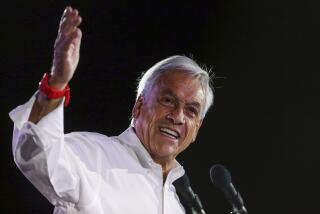Sending a Message
- Share via
The United States will face a difficult choice today when it must cast a highly symbolic vote on a proposed World Bank loan to the dictatorial government of Chile’s Gen. Augusto Pinochet.
On the one hand, an affirmative vote would give aid and comfort to one of the most isolated and detested political pariahs in the world. Pinochet has become increasingly unbearable to the vast majority of Chileans in recent years. His government has lost the support that it once had among middle-class Chileans after the bloody coup that overthrew the government of President Salvador Allende in 1973. As the government’s opponents have taken to the streets to express their discontent and to demand a return to civilian government, Pinochet has responded with repression. To its credit, the Reagan Administration has joined the rest of the world in expressing firm disapproval of Pinochet’s current course. Some U.S. officials argue that a vote against Chile in the World Bank would reaffirm that important stand.
But a vote against the pending $250-million loan to Chile would violate sound principles of both economics and diplomacy. In contrast to other indebted nations in Latin America, Chile has not strongly resisted demands from international banks and other lending agencies that its people tighten their belts to meet their financial obligations. Pinochet has played by the financial rules and should be rewarded, economists argue. Additionally, it is not wise to use a multilateral international agency like the World Bank to apply diplomatic pressure or to express disapproval. That is best done on a bilateral basis, one government to another.
There have been unconfirmed reports recently that, faced with this dilemma, representatives of the United States will abstain when the World Bank executive committee votes on the Chilean loan in Washington. That would not keep the loan, which other members of the committee think is sound, from going through. But neither would it show support for Pinochet.
Under normal circumstances, abstaining would be the prudent course. But the circumstances in Chile these days are not normal; they dictate that firmer action be taken. There have been troubling signs in recent weeks that as Pinochet’s repression has increased, so has the power of extreme elements within the Chilean opposition. Not least among these events was the attempted assassination of Pinochet by leftist guerrillas. The failure of that attack has apparently convinced the rigid old general that God has destined him to rule Chile as long as he wants to, regardless of what the people think. This can only increase the danger of violence by extremists, as moderates in the opposition fail to make any progress in moving Chile away from dictatorship. And, thus far, Pinochet has not shown the slightest inclination to even talk with the moderate opposition, rebuffing requests for meetings even from the head of Chile’s Roman Catholic Church.
That is why the Reagan Administration must swallow its fears and take one more step toward isolating Pinochet by voting against the World Bank loan. It might be only a symbolic gesture, but the message of disapproval that it would send to Pinochet would be less important than the message of hope that it would send to moderates in the opposition. When pondering what to do about Chile, President Reagan, of all people, should not forget the sad lesson of Nicaragua in 1979. There a hated dictator also stayed on too long, because he thought that he had U.S. support. And when he was finally toppled, the radical elements of the revolution were so strong that they easily vanquished the moderates and turned their hatred toward the United States. The United States must not make the same mistake in Chile.
More to Read
Sign up for Essential California
The most important California stories and recommendations in your inbox every morning.
You may occasionally receive promotional content from the Los Angeles Times.













